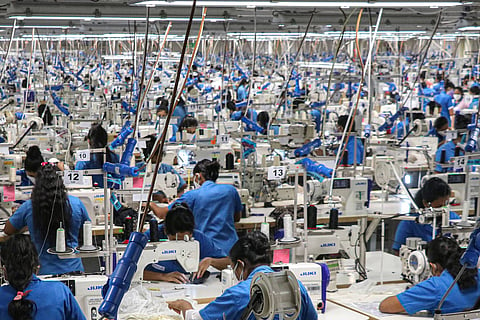Where workers stand in Sri Lanka’s garment-industry boom
The global garment industry is no stranger to scandal – the 2013 Rana Plaza building collapse in Savar, Bangladesh, is perhaps the most obvious and egregious example. Two decades earlier, reports of child labour and other abuses brought widespread condemnation of "sweatshop" conditions in factories, located primarily in the Global South, producing cheap clothing for markets in Europe and North America. At the time, consumers as well as labour advocates mobilised public opinion, threatened boycotts of individual countries and pressured retailers to make changes. In an effort to contain reputational damage, brands introduced corporate social-responsibility programmes and ethical codes of conduct. Yet tensions between the largely Euro-American consumption of cheap clothing and the conditions of labour that make such consumption possible are not easily resolved; they surface with some regularity, even if in reconfigured forms. Most recently, the devastating effects of the Covid-19 pandemic – thousands of workers summarily dismissed without pay, factories shut down overnight, and the "refusal" of retailers to meet key contractual obligations – resurrected concerns about global governance regimes in the apparel supply chain. The logic that labour friendly legislation constitutes an obstacle to growth or even the source of crisis is one that Sri Lankan academics have forcefully rejected.
Like many other countries, Sri Lanka imposed a strict lockdown at the start of the pandemic – in its case running from March to May 2020. Yet, as in other supplier countries, the garment industry – Sri Lanka's biggest exporter, accounting for around 7 percent of the country's USD 84-billion economy as of 2020 – was allowed to restart operations in April. Not surprisingly, a garment factory became the locus of a major Covid outbreak. Events followed a predictable script: workers were denied wages, subjected to intimidation, indiscriminately forced into quarantine by military forces that often treated them like criminals, and stigmatised socially by their association with the industry. Overall, the pandemic had a devastating impact on the 300,000 female garment workers, mostly rural migrants, who toil within and outside Sri Lanka's Export Processing Zones. Meanwhile, apparel brands, retailers and manufacturers continued to profit while cutting costs at every level, further endangering worker health and undermining their job security and income. Attacks on trade unions and a refusal to include worker representatives in shaping Covid-response measures also exacerbated the crisis. Indeed, in the wake of the pandemic and Sri Lanka's ongoing economic crisis, employers are pushing for the government to reform labour laws so as to make the country more "investor-friendly".

